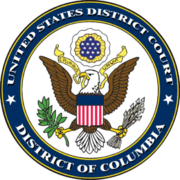
The Hatch Act of 1939, An Act to Prevent Pernicious Political Activities, is a United States federal law that prohibits civil-service employees in the executive branch of the federal government, except the president and vice president, from engaging in some forms of political activity. It became law on August 2, 1939. The law was named for Senator Carl Hatch of New Mexico. It was most recently amended in 2012.

The National Security Archive is a 501(c)(3) non-governmental, non-profit research and archival institution located on the campus of the George Washington University in Washington, D.C. Founded in 1985 to check rising government secrecy. The National Security Archive is an investigative journalism center, open government advocate, international affairs research institute, and the largest repository of declassified U.S. documents outside the federal government. The National Security Archive has spurred the declassification of more than 15 million pages of government documents by being the leading non-profit user of the U.S. Freedom of Information Act (FOIA), filing a total of more than 70,000 FOIA and declassification requests in its over 35+ years of history.
Citizens for Responsibility and Ethics in Washington (CREW), is a nonprofit 501(c)(3) watchdog organization devoted to U.S. government ethics and accountability. Founded in 2003 as a counterweight to conservative government watchdog groups such as Judicial Watch, CREW works to expose ethics violations and corruption by government officials and institutions and to reduce the role of money in politics.

Wilson v. Libby, 498 F. Supp. 2d 74, affirmed, 535 F.3d 697, was a civil lawsuit filed in the U.S. District Court for the District of Columbia on 13 July, 2006, by Valerie Plame and her husband, former Ambassador Joseph C. Wilson, IV, against Richard Armitage (individually) for allegedly revealing her identity and thus irresponsibly infringing upon her Constitutional rights and against Vice President of the United States Dick Cheney, Lewis Libby, Karl Rove, and the unnamed others (together) because the latter, in addition, allegedly "illegally conspired to reveal her identity." The lawsuit was ultimately dismissed.

Ronnie Abrams is a United States district judge of the United States District Court for the Southern District of New York.
Citizens for Responsibility and Ethics in Washington v. Trump was a case brought before the United States District Court for the Southern District of New York. The plaintiffs, watchdog group Citizens for Responsibility and Ethics in Washington (CREW), hotel and restaurant owner Eric Goode, an association of restaurants known as ROC United, and an Embassy Row hotel event booker named Jill Phaneuf alleged that the defendant, President Donald Trump, was in violation of the Foreign Emoluments Clause, a constitutional provision that bars the president or any other federal official from taking gifts or payments from foreign governments. CREW filed its complaint on January 23, 2017, shortly after Trump was inaugurated as president. An amended complaint, adding the hotel and restaurant industry plaintiffs, was filed on April 18, 2017. A second amended complaint was filed on May 10, 2017. CREW was represented by several prominent lawyers and legal scholars in the case.
The following is a list of notable lawsuits involving former United States president Donald Trump. The list excludes cases that only name Trump as a legal formality in his capacity as president, such as habeas corpus requests.

Executive Order 13769 was signed by U.S. President Donald Trump on January 27, 2017, and quickly became the subject of legal challenges in the federal courts of the United States. The order sought to restrict travel from seven Muslim majority countries: Iran, Iraq, Libya, Somalia, Sudan, Syria, and Yemen. The plaintiffs challenging the order argued that it contravened the United States Constitution, federal statutes, or both. On March 16, 2017, Executive Order 13769 was superseded by Executive Order 13780, which took legal objections into account and removed Iraq from affected countries. Then on September 24, 2017, Executive Order 13780 was superseded by Presidential Proclamation 9645 which is aimed at more permanently establishing travel restrictions on those countries except Sudan, while adding North Korea and Venezuela which had not previously been included.

D.C. and Maryland v. Trump was a lawsuit filed on June 12, 2017, in the United States District Court for the District of Maryland. The plaintiffs, the U.S. state of Maryland and the District of Columbia, alleged that the defendant, President Donald Trump, had violated the Foreign Emoluments Clause of the United States Constitution by accepting gifts from foreign governments. The lawsuit was filed by D.C. Attorney General Karl Racine and Maryland Attorney General Brian Frosh.

Blumenthal v. Trump, 949 F.3d 14, was a U.S. constitutional law and federal civil procedure lawsuit heard by Circuit Judges Henderson, Tatel, and Griffith, of the United States Court of Appeals for the District of Columbia Circuit. The case was on appeal from the United States District Court for the District of Columbia, where District Judge Emmet G. Sullivan granted in part and denied in part the President's motion to dismiss for lack of standing, denied the President's motion to dismiss for failure to state claim, and certified interlocutory appeal.
Trump v. Hawaii, No. 17-965, 585 U.S. ___ (2018), was a landmark United States Supreme Court case involving Presidential Proclamation 9645 signed by President Donald Trump, which restricted travel into the United States by people from several nations, or by refugees without valid travel documents. Hawaii and several other states and groups challenged the Proclamation and two predecessor executive orders also issued by Trump on statutory and constitutional grounds. Citing a variety of statements by Trump and administration officials, they argued that the proclamation and its predecessor orders were motivated by anti-Muslim animus.

Knight First Amendment Institute v. Trump, 928 F.3d 226, is a case at the Second Circuit Court of Appeals on the use of social media as a public forum. The plaintiffs, Philip N. Cohen, Eugene Gu, Holly Figueroa O'Reilly, Nicholas Pappas, Joseph M. Papp, Rebecca Buckwalter-Poza, and Brandon Neely, are a group of Twitter users blocked by U.S. President Donald Trump's personal @realDonaldTrump account. They alleged that Twitter constitutes a public forum, and that a government official blocking access to that forum is a violation of the First Amendment. The lawsuit also named as defendants White House press secretary Sean Spicer and social media director Dan Scavino.

American Civil Liberties Union v. Trump and Pence, No. 1:17-cv-01351, is a case pending before the United States District Court for the District of Columbia. The plaintiffs, the watchdog group American Civil Liberties Union (ACLU), alleges that the defendants, President Donald Trump and the Vice President Michael Pence, are in violation of the Federal Advisory Committee Act by establishing the Presidential Advisory Commission on Election Integrity for the purpose of supporting the President's "claim that he won the popular vote in the 2016 election—once millions of supposedly illegal votes are subtracted from the count."

Stone v. Trump (1:17-cv-02459-MJG) was a lawsuit filed on August 28, 2017, in the United States District Court for the District of Maryland. The lawsuit alleged that President Donald Trump's ban on transgender personnel joining the U.S. military violated their equal protection and due process rights. The American Civil Liberties Union (ACLU) of Maryland filed the suit on behalf of Petty Officer First Class Brock Stone, an 11-year veteran of the U.S. Navy, and several other transgender service members. In addition to President Trump, the suit named as defendants the Secretaries of Defense, the Army, the Navy, and the Air Force.

Jane Doe v. Trump (1:17-cv-01597-CKK) was a lawsuit filed on August 9, 2017, and decided January 4, 2019 in the United States District Court for the District of Columbia. The suit sought to block Donald Trump and top Pentagon officials from implementing the proposed ban on military service for transgender people under the auspices of the equal protection and due process clauses of the Fifth Amendment. The court ruled that the Trump administration's policy should not be blocked. Nonetheless, the Trump administration's policy continued to be blocked due to three preliminary injunctions against it that were not part of this lawsuit and which remained in effect as of the lawsuit's conclusion on January 4, 2019.

Karnoski v. Trump (2:17-cv-01297-MJP) was a lawsuit filed on August 29, 2017, in the United States District Court for the Western District of Washington. The suit, like the similar suits Jane Doe v. Trump, Stone v. Trump, and Stockman v. Trump, sought to block Trump and top Pentagon officials from implementing the proposed ban on military service for transgender people under the auspices of the equal protection and due process clauses of the Fifth Amendment. The suit was filed on the behalf of three transgender plaintiffs, the Human Rights Campaign, and the Gender Justice League by Lambda Legal and OutServe-SLDN.
Massachusetts Lobstermen's Association v. Ross is a United States District Court case in the District of Columbia in which the court determined whether or not a President may establish a marine national monument, the Northeast Canyons and Seamounts Marine National Monument, under the authority of the Antiquities Act of 1906. The case represents the first time that the President's authority to create an offshore marine monument under the Act was directly challenged in court. While the District Court upheld the President's authority to designate the monument under the authority bestowed by the Antiquities Act, the case was appealed to the D.C. Circuit and awaits further judicial review.
Before Election Day of the 2020 United States presidential election, lawsuits related to the voting process were filed in various states. Many of these lawsuits were related to measures taken by state legislatures and election officials in response to the COVID-19 pandemic.
In direct response to election changes related to the COVID-19 pandemic and 2020 United States presidential election in Georgia; the Donald Trump 2020 presidential campaign launched numerous civil lawsuits contesting the election processes of Georgia. All of these were either dismissed or dropped.

Thompson v. Trump is an ongoing federal civil case filed in February 2021 on behalf of U. S. House of Representatives Bennie Thompson against former U.S. president Donald Trump. The lawsuit accused Trump and others conspired to incite the January 6 United States Capitol attack. In February 2022, District of Columbia U.S. District Court Judge Amit Mehta ruled that presidential immunity did not shield Trump from the lawsuit. In March 2022, Trump appealed Mehta's ruling to the U.S. District of Columbia Circuit Court of Appeals. In December 2023, the Court of Appeals upheld Mehta's ruling against Trump.









